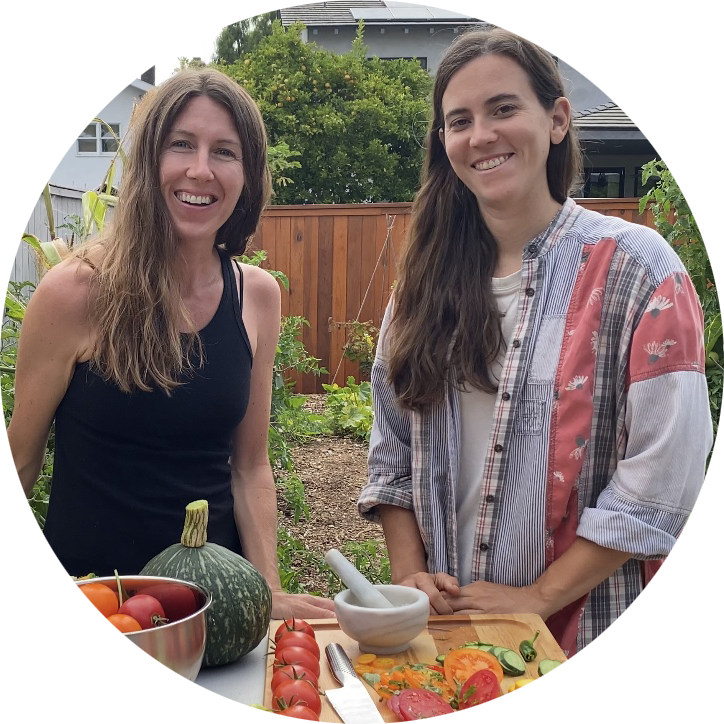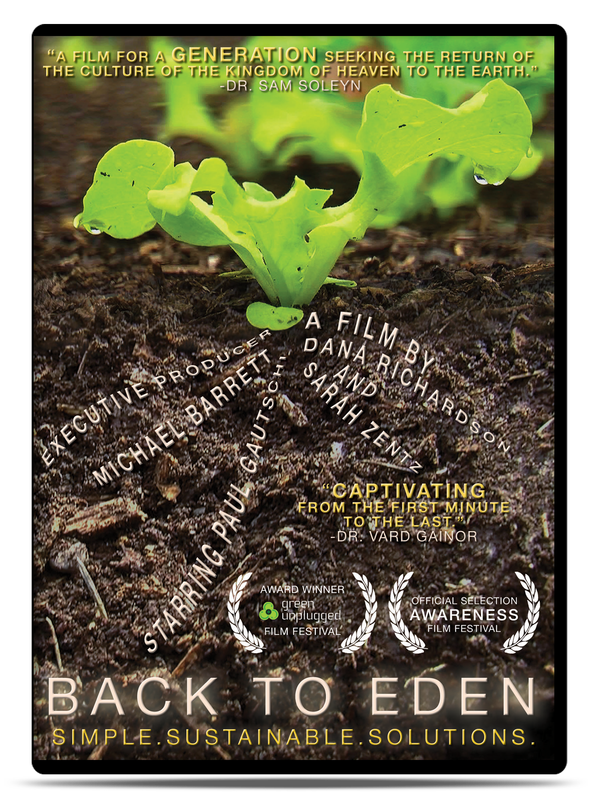|
By definition, urban gardening is "the practice of cultivating, processing, and distributing food in or around cities." The interest in home gardening grew in the year 2020 unlike any year since America's patriotic "Victory Gardens" were planted during World War I and World War II. During WWII, home, school, and community gardeners produced an estimated 40% of the United States fresh vegetables and fruits, from approximately 20 million gardens! This was the last time in history that food security was under attack until COVID-19 caused the entire world to go on lockdown. In 2020, a resurgence of home gardens grew across the entire world setting record breaking demands for seeds, soil, and plants. Ten years ago, we (Dana & Sarah) produced a documentary about gardening called BACK TO EDEN. We both decided that in addition to the main star, Paul Gautschi, a gardener and arborist from Washington, we wanted to include both of our families in the documentary. If we wanted to change the world, we knew we had to start with our own relatives. Neither of our parents had acres of land. Mark and Diane (Sarah's parents) installed a demonstration community garden at a church in Gettysburg while Ron and Sylvia (Dana's parents) installed a demonstration backyard garden at their home in California. The goal of the demonstration gardens was to show that Paul Gautschi's gardening method could be implemented in diverse soil conditions and climates. In 2011, BACK TO EDEN premiered online, streaming for free, and immediately went viral. The documentary quickly ignited a global gardening movement called, "Back to Eden Gardening." Fast forward nearly 10 years after the release of the film, Back to Eden Gardening is renowned as one of the best gardening methods in 2020. During the first month of quarantine in the United States, BACK TO EDEN received nearly 1 million views on YouTube. Quarantine brought on a new wave of beginner gardeners who were desperately searching for the best ways to grow food at home. Living in Los Angeles, California, we found ourselves under a "safer at home" order which encouraged us to spend more time in our urban garden. We shared our urban gardening experiences daily on Instagram hoping to teach and inspire other home gardeners! Although our backyard and front yard gardens total less than ⅛ of an acre, we were able to grow all of our own produce this year enabling us to have food security during these difficult time. Since we have limited space we focused on creating rich soil. The fact is, when your soil is full of nutrients, you are able to grow a high quantity of nutrient-rich food in a small garden plot. We grew everything from Apples to Zucchini in our small urban garden. To this day, both of our parents are still gardeners who practice the Back to Eden Gardening method. Mark McOmber offers tours of his community garden in rural Pennsylvania and shares a wealth of knowledge on his YouTube channel.
This is a vegetable gardening guide for beginners that includes essential steps you need to take to start a garden. Growing a vegetable garden is one of the most life-changing and rewarding things you can do. Starting a vegetable garden using organic gardening principles can save you time, money, and labor while greatly benefiting the environment. This guide starts at improving the soil and will cover every step you need to take for your starting your vegetable garden. Improve the SoilThe first step to start a vegetable garden is to improve the soil. Most importantly, do not till the soil! Tilling the ground is the most destructive thing you can do since tilling causes soil erosion and loss of soil diversity resulting in sterile soil that required more input. Instead, use a no-dig gardening technique that dramatically improves the health of the soil and environment. Once you pick a sunny area for your garden plot, layer the following material in this order: HOW TO START A VEGETABLE GARDEN
WHAT TIME OF YEAR IS BEST TO START A VEGETABLE GARDEN? It is ideal to start a vegetable garden in the Fall when wood chips are readily available and have time to compost over winter. However, you can start a vegetable garden any time of the year! Pick What You Want to PlantThe second most important part of starting a vegetable garden is the seeds you plant. For the best results, plant non-GMO heirloom seeds in your vegetable garden. Heirloom seeds produce the best tasting and most nutritious fruits and vegetables. You can save your own seeds if you plant heirloom seeds which can save you money in the long haul. There are so many incredible varieties of heirloom seeds available from the leading heirloom seed companies. RECOMMENDED SEED COMPANIES Get $20 OFF an ARK Heirloom Seed Kit using the code: WOODCHIPS HOW DO I PLANT MY FIRST VEGETABLE GARDEN? Plant your heirloom seeds in your improved soil by pulling back a row of wood chips and planting in the compost below the wood chips. Many vegetable seeds are extremely tiny and need to be directly sowed into soil. Seeds need water to germinate so make sure to water your seeds daily so they do not dry out. TIPS FOR GROWING A PERFECT VEGETABLE GARDENMULCH, MULCH, MULCH your vegetable garden to ensure all the wonderful benefits of mulching! Mulch helps reduce weeding, watering, fertilizing, and working! If you notice weeds growing in your garden, pull them out or add more wood chip mulch to smoother weeds. If you notice plants wilting, you can always add more wood chip mulch to help conserve watering needs. Sign up for a free delivery of wood chips today!
WHAT IS BACK TO EDEN GARDENING? Back to Eden Gardening is the practice of growing plants in a no-dig vegetable garden that utilizes wood chip mulch to conserve water and regenerate soil. Back to Eden Gardening is a regenerative agriculture technique that implements organic gardening principles and is considered one of the best sustainable permaculture methods for growing food. Back to Eden Gardening started because of the documentary film, BACK TO EDEN, featuring American gardener and arborist Paul Gautschi. Paul pioneered a no-dig gardening method that implements wood chip mulch to conserve water and regenerate soil. BACK TO EDEN was Produced and Directed by Dana Richardson & Sarah Zentz and released in 2011. The documentary went viral gaining millions of views and ignited a global gardening movement. Learn more about how to grow a Back to Eden Garden by watching the free documentary BACK TO EDEN. WHAT IS NO-DIG GARDENING AND NO-TILL GARDENING? No-dig gardening also called no-till gardening is a non-cultivation method that does not practice tilling the soil. Paul Gautchi is a no-till gardener. However, the no-dig gardening movement has a long history and famous pioneers including Masanobu Fukuoka a Japanese farmer who pioneered "do nothing farming" and Ruth Stout an American gardener who wrote the "Gardening Without Work" and "No Work Garden" book. Masanobu Fukuoka and Ruth Stout used straw as a mulch. Paul Gautschi pioneered the no-dig gardening method that uses wood chips as a mulch. WHAT IS WOOD CHIP GARDENING? Wood chip gardening is the practice of covering your vegetable garden and fruit orchard with wood chip mulch. Wood chips will improve your soil and regenerate the natural life in the soil instead of the use of toxic chemicals that deplete the soil and create soil loss. Sign up to get a free delivery of wood chips from your local tree service company. ARE WOOD CHIPS GOOD FOR SOIL? Wood chips are good for your soil and good for the environment! Wood chips dramatically reduce watering, weeding, and labor while preventing soil erosion. Wood chips are an organic, biodegradable, carbon based material that decomposes over time transforming your soil into a dark, carbon-rich, compost material. Composted mulch enriches your soil with nutrients which increases the product and quality of your plants and garden. CAN I USE FRESH WOOD CHIPS IN MY GARDEN? Fresh wood chips come from a renewable resource -- tree pruning waste! Back to Eden Gardening uses fresh wood chips that are 90% needles, leaves, and branches that have been chipped from tree trimming waste. It is important to understand that the leaves are a source of nitrogen and the branches are a source of carbon. This ratio creates an ideal mulch gardening material when the wood chips have composted. Paul Gautschi has multiple gardens and orchards in which he utilizes both raw, composted, and screened wood chips. HOW LONG DOES IT TAKE FOR WOOD CHIPS TO DECOMPOSE?
Wood chips start to decompose immediately and it takes wood chips at least 3 months to decompose. Composted wood chips are chipped tree trimmings that have had time to break down and have composted for at least 3 months. Your wood chips will heat up and decompose quicker in Summer months. No matter if you are a beginner gardener or an experienced gardener, you will find that Back to Eden Gardening is easy one of the easiest methods of gardening with the best results. What is Back to Eden Gardening?Back to Eden Gardening is a no-till, regenerative agriculture method and made popular in the documentary Back to Eden featuring Paul Gautschi. This means if you are tilling, using toxic chemicals (chemical herbicides, pesticides, or fertilizers), you are not practicing the Back to Eden Gardening method. Back to Eden Gardens respect that every plant, animal, insect, and microorganism has a beneficial purpose and works to achieve balance and sustainability in the soil. You will see amazing results in the fertility and health of your soil! Healthy soil is the essential key to growing vegetables and fruits that taste amazing and have a greater nutritional value. Unlike conventional gardening and traditional farming methods Back to Eden Gardening requires less and less input over time with a higher and higher yield every year. GARDEN SUPPLIES to Start a Vegetable GardenSoil, Mulch, and Fertilizer1. GET MULCH FOR A VEGETABLE GARDEN Wood chip gardening is the practice of covering your vegetable garden and fruit orchard with wood chip mulch. Wood chips will improve your soil and regenerate the natural life in the soil instead of the use of toxic chemicals that deplete the soil and create soil loss. Back to Eden Gardening uses wood chips that are 90% needles, leaves, and branches that have been chipped from tree trimming waste. It is important to understand that the leaves are a source of nitrogen and the branches are a source of carbon. This ratio creates an ideal mulch gardening material when the wood chips have composted. Paul Gautschi has multiple gardens and orchards in which he utilizes both raw, composted, and screened wood chips. Learn more about the best type of wood chips for your garden by clicking here.
Composted animal manure is a clean, natural fertilizer that can be used in a vegetable garden. Let animal manure compost or you may be planting grass and weed seeds!
If you are going to turn a lawn or weed infested are into garden plot smothering the weed seeds is a must! We recommend that you apply at least 4 sheets of paper that overlap. Then, wet down the newspaper so it adheres to the ground below and doesn't blow away. Garden ToolsWhen installing a no-till vegetable garden, the number one rule is to always avoid disturbing the soil, mimic the design of nature. How do you prepare the soil? You always add layers of compost, and composted animal manure and cover the soil with mulch. The most commonly used mulch in Back to Eden Gardening is wood chips. However, find whatever resource is local to you. For example, straw is also a popular mulch. There is almost always a FREE option when it comes to Back to Eden Gardening. 1. WHEEL BARREL If you are a beginner gardener you may feel overwhelmed at thought of moving an entire wood chip pile but moving wood chips is not as hard as you'd think! Using a wheel barrel makes moving wood chips a low stress work out. If you get the help of a few friends of family members you can move a mountain of wood chips in just a few hours. Or take your time, move it little by little! If you live on a larger property or have access to a Front End Loader Tractor this will be a more practical way to cover a large scale garden or small farm. 2. MULCH SHOVEL & MULCH FORK A mulch shovel and mulch fork make scooping the wood chips easy. Using a regular shovel is very challenging due to the chips and twigs getting stuck or jammed and the scoops not being large enough. 3. GARDEN RAKE A garden rake allows you to spread the wood chips easily on top of your garden without disturbing the soil. It also helps to make rows when planting! 4. GARDEN HOSE & SPRINKLER Back to Eden Gardening reduced garden irrigation needs up to 90% ! That is because the mulch layer retains moisture that would otherwise evaporate and the wood chips retain water they release slowly into the soil even after you stopped watering. However, to get your seeds germinated you should water them every day until they germinate! Make sure to use a hose head sprinkler that allows you adjust the setting to a light mist or shower spray. It is a common mistake to loose seeds in the mulch by planting too deeply or watering too heavily and therefore they won't germinate. OPTIONAL: Add a water filter on to your garden hose to reduce chlorine, VOCs, herbicides, and pesticides. Garden Maintenance1. GARDEN GLOVES It is a great idea to invest in garden gloves to protect your hands while maintaining your garden! 2. PH SOIL TEST KIT
How To START a Vegetable GardenIdeally we recommend starting a Back to Eden Garden in the Fall (September-December), mimicking when nature covers the ground with needles, leaves, and branches. This is beneficial because when you lay down your covering layer of newspaper, compost and wood chips in the fall the organic matter has time to break down with the rain and snow during the winter, giving your soil more time to improve and decomposing the wood chips, leaves, newspaper into composted material.
|
AUTHORSCategories
All
|
BACK TO EDEN GARDENING |
JOIN THE MOVEMENT |
CONTACT US |
© 2022 Back to Eden Film. All rights reserved.













 RSS Feed
RSS Feed